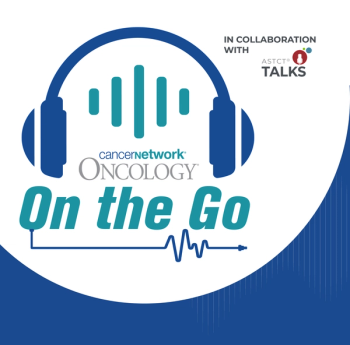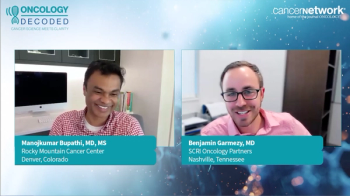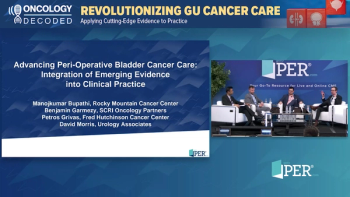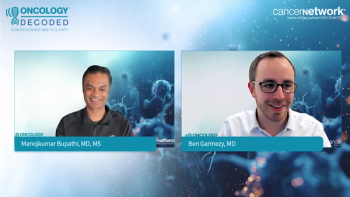
Nathan Goodyear, MD, discussed key insights in integrative oncology care as well as evidence-based, patient-centric tools that may optimize QOL outcomes.

Your AI-Trained Oncology Knowledge Connection!


Nathan Goodyear, MD, discussed key insights in integrative oncology care as well as evidence-based, patient-centric tools that may optimize QOL outcomes.

Rahul Banerjee, MD, FACP; and Brooke Adams, PharmD, BCOP, discussed the top hematologic oncology abstracts from the 2025 ASH Annual Meeting and Exposition.

Hosts Manojkumar Bupathi, MD, MS, and Benjamin Garmezy, MD, discuss presentations at ESMO 2025 that may impact bladder, kidney, and prostate cancer care.

Professor of pharmacology Eric Winer, MD, spoke about a publication he authored exploring the state of oncologist burnout and how it impacts practice.

Advances in next-generation sequencing and gene expression are reshaping T-cell lymphoma classification and the use of targeted therapies.

Integrating psychosocial care into cancer care allows patients to receive emotional support, counseling, and coping strategies to help navigate treatment.

The “inescapability” of climate hazards may necessitate prioritization of research to improve outcomes among vulnerable populations who require treatment.

Experts from Washington University in St. Louis discuss prior data and strategies for mitigating toxicities like CRS associated with tarlatamab in SCLC.

Low grade serous ovarian cancer, a rare epithelial ovarian cancer subtype, requires differentiated treatment from its high-grade counterpart.

Hear from leading cancer experts about the lasting impact the COVID-19 pandemic has left on clinical practice.

A brief overview of the current RCC landscape was provided in the most recent Oncology Decoded podcast.

A brief overview of the current RCC landscape was provided in the most recent Oncology Decoded podcast.

A patient case of a 50-year-old man with hormone-sensitive prostate cancer sparked a debate among oncologists regarding the best course of action.

A patient case of a 50-year-old man with hormone-sensitive prostate cancer sparked a debate among oncologists regarding the best course of action.

The Oncology Decoded podcast highlighted the impact of the results from the NIAGARA trial for patients with bladder cancer in a post-ASCO GU discussion.

Clinicians outline the significance of the MZL Workshop, where a gathering of international experts in the field discussed updates in the disease state.

Manojkumar Bupathi, MD, MS, and Ben Garmezy, MD, discuss how to optimize treatment approaches for genitourinary cancers through evaluation of real-world data, sequencing strategies, and toxicity management while working to bridge care disparities between community and academic settings.

Michael P. Bogenschutz, MD, discusses the efficacy, safety, implementation, and future research of psilocybin for cancer-related psychological events.

Paolo Tarantino, MD, and Matteo Lambertini, MD, PhD discuss findings related to CDK4/6 inhibitors and antibody drug conjugates presented at SABCS 2024.

Authors of an article published in ONCOLOGY® detail how a novel multidisciplinary lifestyle medicine clinic can meet the needs of cancer survivors.

Two oncologists discuss the impact of advocacy in kidney cancer research, highlighting collaboration between researchers, advocates, and physicians.

A nurse practitioner discussed risk factors, diagnostic challenges, and treatment planning in patients with pancreatic cancers.

Uterine transposition, a surgical approach preserving fertility by moving the uterus out of the radiation field, may improve gynecologic cancer outcomes.